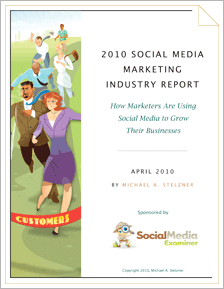Social media is hot and being adopted by small and huge businesses alike - as a channel transcending the middleman and connecting brands directly with people it can only gather more momentum.
Yet, despite all the hype and potential - how much are you actually doing in social media? My guess is not very much or at least not as much as your gut tells you that you should be doing. Why?
The F Word (again)
My experience is that it"€™s primarily fear of the unknown that is preventing faster adoption because there are simply so many questions for a busy team to answer:- how much to spend, how much time to invest, which tools to use, how to resource it and how to measure success. There"€™s a lot to learn before investment can be justified to senior management and an already massive agenda of work.
Well, some help is at hand - this new report by Michael A. Stelzner is definitely going to help address some of those critical questions - he"€™s interviewed 1,900 marketers of all levels of experience - people like you.

The link to the report is here, I"€™ve also summarised the key take-aways below.
Note: this report is well timed 🙂 Mr Stelzner has an impressive online summit starting on 4 May with some of the biggest names in social media involved (see the big ad on page 10), that plug aside it really is valuable stuff and bodes well for the summit.
1,900 B2B and B2C Marketers Share Their Social Media Experience & Insights
- The top three questions that marketers want answered - do you agree?:
- How do I measure social media return on investment?
- What are the social media best practices?
- How do I best manage my time with social media?
- You are not alone, marketers are mostly new to social media: Though 91% are using social media, 65% of marketers surveyed have only been involved with social media marketing for a few months or less. Whereas 31% have being at it "€œfor years"€
- Like any other area - you need to invest time to get results. 56% of marketers are using social media for 6 hours or more each week, 30% investing 11 or more hours weekly and 12.5% spending a meaty 20+ hours per week
- Experience with social media seems to dictate how much time people invest - so the rewards are clearing worth it as your experience grows, equally younger people under 30 are more likely to invest time into social media marketing, possibly even driving the agenda
- The top benefits of social media marketing:
- Eye-balls! The number-one advantage of social media marketing (by a very long way) is generating brand exposure as indicated by 85% of all marketers surveyed
- 52% use it to generate qualified leads and 63% to drive traffic - 72% also feel that social media improves search ranking
- Building new business partnerships (56%) is a quick win that even low level users are reporting
- Interesting that 48% felt it reduced overall marketing expense - smaller businesses were more likely to report this, which makes sense
- No real surprises on the top 4 social media tools: Twitter, Facebook, LinkedIn and blogs - Facebook is getting more and more popular with everybody
- Blogging is on the up (but MySpace shrinking): A significant 81% of marketers plan on increasing their use of blogs, while 72% have no plans to use MySpace and 9% will actually decrease their use of MySpace. Blogging is more important to those experienced in social media marketing but is also a future area for small businesses to invest
- 73% (mostly experienced users) are going to increase investment in You Tube / video, and 85% plan to increase use of Twitter
Social media tools that marketers most want to learn about: Social bookmarking, Twitter and Facebook
- Only 14% of businesses are outsourcing any aspect of their social media marketing. My gut is that it"€™s so new to most marketers and we"€™ll see much more of this in the next year or two as we get used to effectively managing such a new process - are there enough good places to out-source?
- Smart phone usage is on the social marketer"€™s horizon - 65% of B2C companies were interested in interacting with mobile fans, whereas 60% of large businesses were interested in mobile advertising. Hmmm, enough said!
The data suggests that Facebook and Twitter form the basic building blocks, and that blogging, community sites and You Tube are the natural progression with both results and experience - opening up confidence, commitment and resource.







